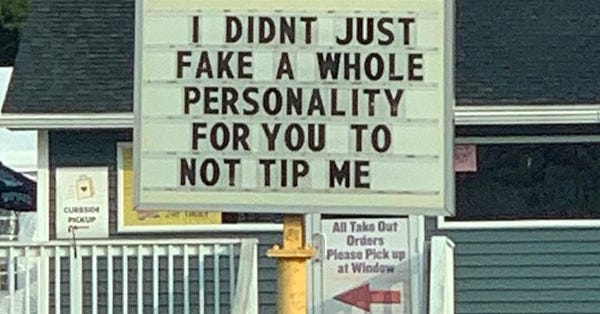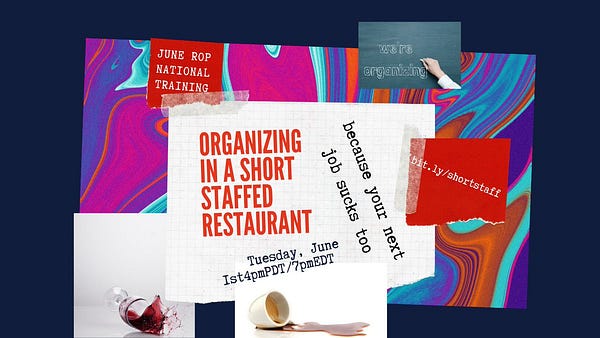The Restaurant Organizing Project Is Betting Workers Can Remake the Industry
The group is working to organize a notoriously difficult business
There’s been a lot of talk about the restaurant industry over the last month or so as lockdown restrictions loosen, and businesses look for staff in a labor market that’s tighter than expected. Worker power is at a high point.
Natalia Tylim is one of the cofounders of the Restaurant Organizing Project, a DSA-led initiative that acts to support workers in the restaurant industry around the country organize for better wages and conditions.
We talked this week about the industry, ROP’s work, and how the pandemic changed the game.
This interview has been edited and condensed for clarity.
Your support makes these stories possible. If you’d like to make a monetary subscription to help fund my reporting, please become a paying subscriber and sign up for a monthly or annual donation.
“I've been a socialist and a political activist for about as long as I've been a restaurant worker”
Eoin Higgins: Natalia, thanks for speaking with me. Can you tell us a little about your background, and how you got involved with this project?
Natalia Tylim: I’m based in Brooklyn. I've been a restaurant worker for 15 years. I've been at my current job for a long time, for about a decade. I was never one of those people that thought of it as a side gig; it was always like my primary source of income. And what I really liked about it was that it allowed me kind of the flexibility to have my job and then have my life and my politics kind of separate.
I've been a socialist and a political activist for about as long as I've been a restaurant worker, maybe a little bit less. I've always been active at my workplace and talking to people and pushing back against things that were wrong. I had never thought of it as like my primary area of organizing just because when you think of things from a million-foot view, my small restaurant job never felt like the most important thing in a strategic sense.
But because of the pandemic, that's all been kind of flipped on its head—there was something kind of new and radicalizing happening in restaurants across the country.
I started talking to other restaurant workers confirmed that feeling and we were like, why don't we start a project and get people together and see what can be done and what can be built at a particular moment where everybody's talking about the industry in ways that we've talked about as restaurant workers forever, but that weren't as public and generalizable discussions before. And that's kind of how the restaurant organizing project started.
EH: When did you guys launch?
NT: Our launch meeting was in the very beginning of April of last year, 2020. It was the beginning of the COVID closures, that moment of everybody freaking out being like, oh my God, is the restaurant industry ever going to come back? What the fuck just happened? People in places where restaurant didn't close were like, am I going to be going to work risking my life for two dollars and 13 cents an hour? Like, what the fuck? It was kind of an immediate response to the initial crisis.
EH: Are you front of the house or back in the house?
NT: I'm front of the house.
EH: Gotcha. And what about the makeup of the group? Is it mostly from the front or mostly from the back? Or is it a mix—how would you kind of define that?
NT: It's definitely a mix. We’re based on a model of people building locally where they are. Different locales have different characters or are more represented in one side of the house than the other. Nationally, it's definitely a mix.
“Our mission is to bring restaurant workers together”
EH: You’re a national project of the Democratic Socialist of America. Can you tell me a little bit about how that works and that relationship?
NT: DSA has this giant infrastructure. It has a bunch of new young members, many of whom are situated in the service industries. There was a way for us to use this national infrastructure that exists to build a restaurant led labor campaign around that. It was built intentionally as a DSA project. We approached somebody on the national Labor leadership, the Democratic Socialist Labor Commission. She had also been a restaurant worker for a long time and had been an organizer who'd been fired for organizing at her restaurant in New Orleans. She signed on to the project and from there it kind of made it more of an official thing.
EH: How would you describe your mission and what work have you done so far?
NT: Our mission is to bring restaurant workers together, to have strategy discussions and figure out how to organize themselves. There’s not just one model that's going to work, we have to experiment, and people need to try different things. We're not a project that will choose one place and focus on that. Rather, we want to have a network in place so that when there's people who are organizing in their workplace organically.
There's been a lot of places, especially coffee shops and breweries, that have organized that we've been able to bring them into our meetings to share what they went through, what their tactics were, and what their strategy was, to try to spread the word to other people who are trying to figure out what to do.
The other thing is that there's been a lot of stuff happening with unemployment. We had a national day of action [last year] that we organized in collaboration with several other groups, including Unite Here, to demand the extension of unemployment benefits when they were about to expire. Something like 15 or 16 cities participated.

When cities were opening up and kind of bringing indoor dining back, we did a series of actions in different cities and campaigns demanding that restaurant workers be eligible for vaccinations before door open.
And obviously, like, I'm not going to say that it's a direct result of our organizing, but that did end up happening in in cities around the same time.
EH: It sounds like you guys have a lot of flexibility, which is good considering the industry.
NT: In different cities, things look different. In Austin, they're very focused on building workplace campaigns. We're having a lot of success bringing people around in some of those discussions at different workplaces in New York. We're trying to bring people together and figure out whether we want to pick a neighborhood to really focus on in terms of organizing or whether we want to do something around the right to recall, which would mean that workers are having to be brought back to work if their jobs come back.
Things look different in different places, but in general, the idea is: What materials, meetings, discussions can we put together nationally that can give people tools and confidence to organize where they are? That's very much what we're focused on.
“Nothing in this entire year has played out the way that I predicted it would”
EH: What's next for you guys? What do you think like the rest of the year is going to look like? Restrictions are loosening the country's opening back up economically. Restaurants are coming back. Where do you kind of see the mission of the Restaurant Organizing Project going over the next year or so?
NT: The one thing I'll say is that nothing in this entire year has played out the way that I predicted it would.
So yes, things are opening. But also, now you have this, quote unquote, labor shortage, which is really just people being like, what the fuck? I'm not going back to that.
The reality is that restaurant workers have more leverage than we had before the pandemic, which I did not expect. I really thought in that initial moment where we were all unemployed all at once, OK, are we ever going to be able to get restaurant jobs again? And now you have this situation where no one can hire and workers who are at restaurants—and I can attest to this—we're all doing way more with less people than ever before.


EH: How do you get people to stay engaged? The business is pretty famous for turnover.
NT: The instinct at a restaurant is to be like, oh, my God, I hate this, I can't do it even one day longer, I'm leaving. I just don't want to do it anymore. There's got to be a way to push through the moment and be like, you know what, if I hate this job so much that I'm going to leave, I might as well stay and try to make it better because there's no job that's better than this one. There's no, quote unquote, better job.
What we want to do is be able to be flexible and really focus on building up an infrastructure that restaurant workers can find when they're in one of those situations of not knowing what else to do and being like, oh, I just can't take it anymore. It needs to be different.
Ideally, if we can get our name out there, we want to bring as many restaurant workers into the fold as possible and be able to give people the tools to organize themselves in whatever situation they're finding themselves. And from there be able to build out a base of restaurant workers that can strategize and build around these issues more holistically. That's kind of the overall vision.
EH: Can you define what you mean by holistically in this sense?
NT: Well, like I said, the restaurant industry standards are set nationally or at least state by state or city by city, it's not the situation where each workplace is so fundamentally different. It's like the minimum wage, the divisions between front of house, the back of the house, the tipping system. These are things that I think need to be changed across the board in order for labor conditions to be different. I don't think we're going to win those things by a legislative strategy.
My sense is, if we can build up a base of restaurant workers that's rooted in restaurants across the country to try to put forward a vision around what a more just industry look like where people had a living wage and had access to health care and where every worker had amnesty, these are the things that workers could, from our vantage point, remake the industry in a way that we thought was fair and balanced.
What would we put forward and how would we put that on the agenda? It wouldn't be like something you could win only in one workplace. It would be something that you would have to change in the culture of the restaurant industry overall to make it stick.
Thanks for reading. There’s more to come on this story, and others.
Talk next week. In the meantime—here’s some music.






